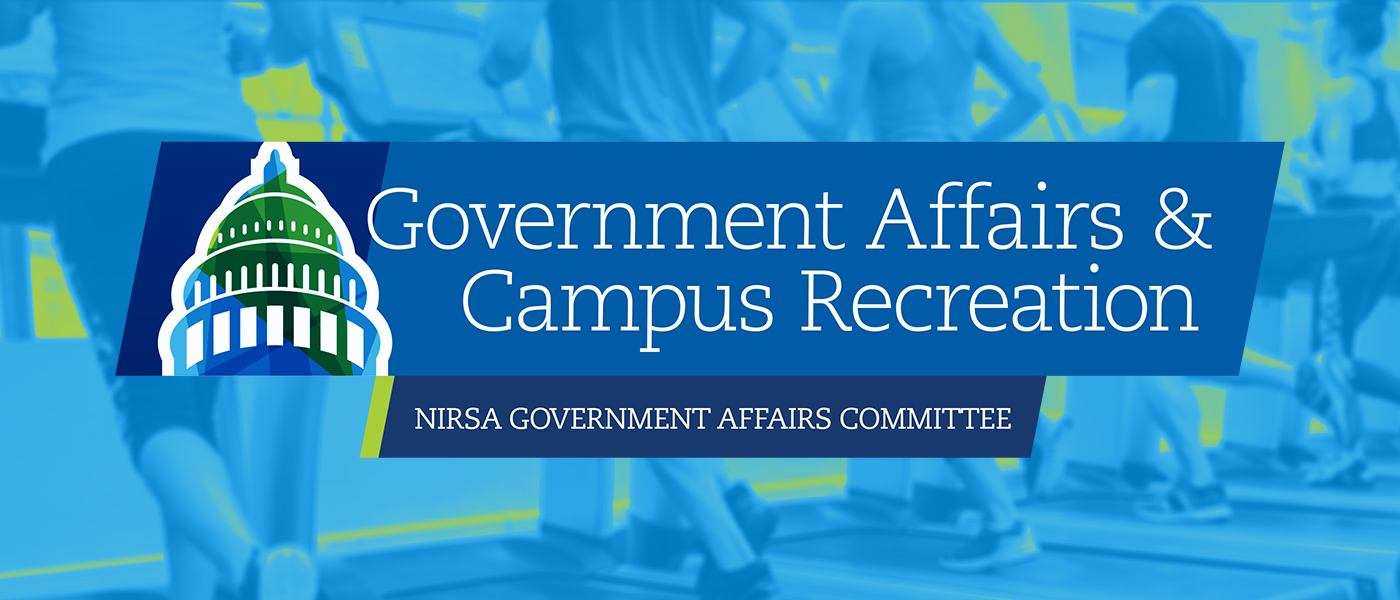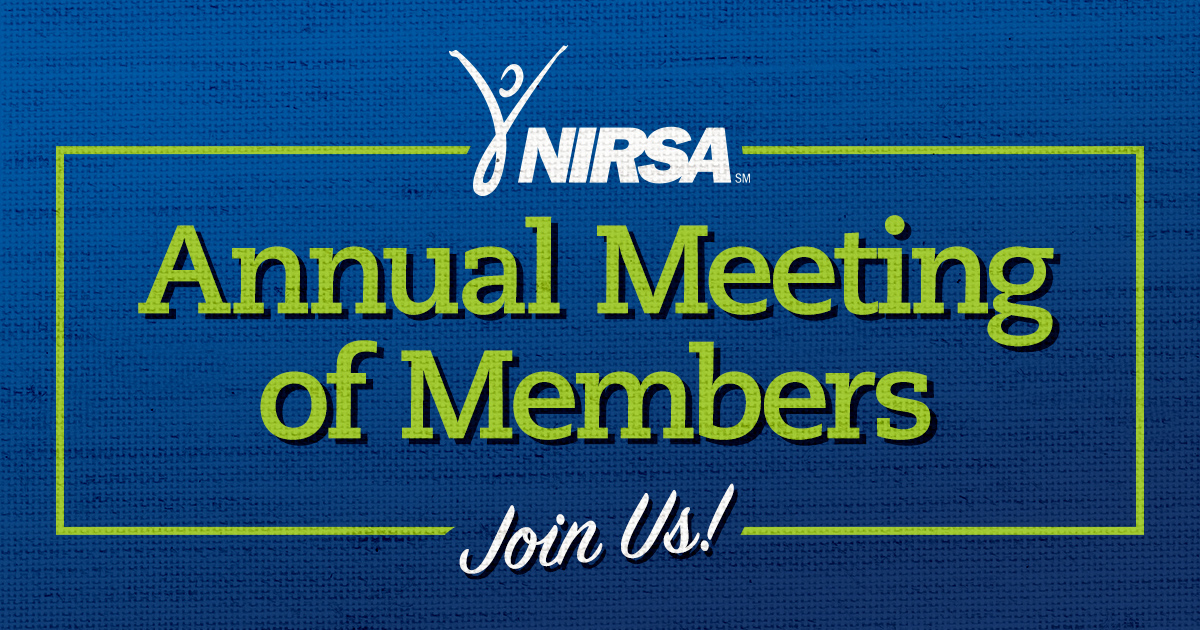Who are we?
Since the Policy and Legislation Committee became the Government Affairs Committee in 2018, the committee has been comprised of a hardworking group of professionals and students who help determine how to surface issues relevant to the campus recreation field, who decide which issues need to be addressed, and who forecast which issues may arise in the future. To this end, the committee was charged with creating a policy agenda to help guide NIRSA’s work in regards to legislation at a national, state, and local level. The agenda aims to assist and support NIRSA members as they navigate a pleathura of issues on their campuses.
How do we do it?
The policy agenda, which was created in 2019 and approved by the NIRSA Board of Directors, is based on the principles that NIRSA supports as they pertain to policies promoting and advancing success for both students and the higher education practitioners who support them and the communities in which they live. The agenda is structured to educate policymakers and others about the work and impact of NIRSA and our members. It has four broad categories:
1. Higher education impacts
NIRSA is committed to cultivating and fostering an environment of growth, safety, and inclusion for students, faculty, and staff in postsecondary education. NIRSA supports policies that recognize the benefits of higher education and advance opportunities for all. NIRSA will provide leadership on issues including affordability, access, recreational facilities and programs, student development, student leaders, the co-circular experience, and the advancement of the profession.
2. Wellbeing and healthy communities
NIRSA plays an integral role in promoting physical activity, active living, wellbeing, campus safety, mental health, access to health services, and sustainability strategies that impact students and campus recreation professionals. NIRSA supports policies and programs that recognize the benefits of healthy communities and that positively impact the physical, mental, and social health of our students, members, and institutions.
3. Social justice and inclusiveness
NIRSA promotes equity, diversity, inclusion, justice, and safety on college campuses for their students, faculty, and staff. NIRSA is committed to fostering increasingly more diverse, inclusive, and just campuses that actively support all students and help cultivate democratic campus environments. NIRSA will support policies and programs that bring our students, members, and institutions together and which give a voice to diverse people, thoughts, opinions, and views.
4. NIRSA strategic value areas
NIRSA will take an active role to move forward policies and actions that maintain the values of our profession: equity, diversity, and inclusion; global perspectives; health and wellbeing; leadership; service; and sustainable communities. NIRSA will support and advocate for policies to ensure our strategic values are elevated and moved forward.
NIRSA will direct efforts towards key public policy issue areas. As part of this policy agenda, each of the broad categories will be shaped around four action strategies: advocate, promote, collaborate, and inform.
Advocate (A): NIRSA will advocate for students and employees who represent diversity on a broad range of dimensions including gender, sex, sexual orientation, language, age, ability status, national origin, religion, socio-economic status, as well as race, ethnicity, and heritage. NIRSA supports individuals interested in becoming involved in advocacy work on their campuses and who educate student, faculty, staff, and other leaders on how to engage in such actions. This includes allocation of resources by NIRSA HQ, NIRSA Board positional statements, activation of the Government Affairs Committee, and utilizing NIRSA and our members’ spheres of influences to do such work.
Promote (P): NIRSA is devoted to the support and promotion of policy and government action that advances the Association. NIRSA will formulate strategy around promotion that adheres to our values and strategic visioning. Strategy is formulated by the NIRSA Board, by NIRSA HQ, or by the Government Affairs Committee with endorsement from the NIRSA Board of Directors. Allocation of resources is determined by NIRSA HQ where appropriate. The Government Affairs Committee will be activated and tasked if it is needed to assist in any promoting efforts.
Collaborate (C): NIRSA is committed to collaborating with organizations and partners that support and align with our desire to cultivate learning and growth by fostering lifelong habits of wellbeing. NIRSA HQ will develop and nurture collaborations to include allocation of resources where appropriate. The Government Affairs Committee will be activated and tasked if needed to assist in any collaborative efforts.
Inform (I): NIRSA will observe and analyze the progress of government action and legislative policy that concerns topics related to campus recreation and higher education. This includes aligning and positioning resources for later strategy and disseminating information to members in an effort to educate. The goal is to educate NIRSA’s membership while continuing to monitor issue(s). The Government Affairs Committee and NIRSA HQ will be tasked with managing this action strategy. NIRSA Board position or action isn’t required at this stage.
What are we currently working on?
As of June 2020, the Government Affairs Committee has determined the following topics as the areas of focus for the upcoming year.
|
Topic/Issue |
Action Date |
Action Strategy |
Broad Category |
||||||
|
Advocate |
Promote |
Collaborate |
Inform |
Higher Ed |
Wellbeing & Health |
Social Justice |
NIRSA Values |
||
|
Civic Responsibility and Voting |
|||||||||
|
Social Justice and Anti-Racism |
|||||||||
|
Title IX |
|||||||||
|
Transgender Athlete Participation |
|||||||||
|
Sports Officials Harassment |
|||||||||
Policy agenda processes, stewardship, and oversight
Good policy agenda processes and practices are like a recipe: They require the right ingredients (the right mix of Board members, volunteer leaders, HQ staff, and members), a chef to provide leadership and accountability, and careful mixing and stirring of candid discussions, transparent practices, resource allocations, and actions. Making this recipe come together successfully requires the following:
- Surfacing of topics and issues impacting the profession, Association, or members.
- Delegating authority and responsibility regarding policy agenda actions.
- Utilization of the policy agenda matrix to chart and map focus and strategy.
- A communication plan for disclosure to membership.
- Continual review and assessment of the policy agenda matrix and actions taken.
This framework helps guide and assist processes and practices to enable a successful policy agenda. This is not a prescriptive framework.; it is generalized to maintain nimbleness and the ability to move an agenda forward (or to discontinue an agenda) with ease.
There are a few things to note about the broad categories and action strategies:
- Within the broad categories, the committee picks several topics/issues each year to focus our efforts on. This is not to say these are the only things we pay attention to or the only things worth noting; the policy pages, for example, will continue to inform members about a wide variety of issues. Topic selection simply helps focus our work and is, of course, subject to change as the world changes.
- The committee also knows that almost all topics could fit into almost all of the broad categories. Picking one helps the committee decide which lens we will most—although not exclusively—view the issue through.
- Like with the selection of topics/issues, the committee will select an action strategy at the start of the year to provide structure and an agreed upon foundation for the group. It is also subject to change as needed since we know all of the issues are dynamic.
Connecting with the Government Affairs Committee
Because we live in an ever-changing environment, it is almost impossible for us to keep track of all the state and local policies that may affect higher education. We rely on our vast network of NIRSA members to help keep us informed of legislation and other topics that might need our attention. Please feel free to reach out to anyone on the committee if you have questions, comments, policy updates, or just want to chat (We are a friendly bunch!). When you boil it down to the basics, we’re here to help you understand and navigate how policy and legislation may affect your students and/or how we do our jobs. So now you know—and knowing is half the battle.
- For more information, please contact NIRSA Director of Advocacy & Strategic Partnerships Erin O’Sullivan.
Chris Crume is currently the Director of Aquatic Center at Denison University. He serves as co-chair of NIRSA’s Government Affairs Committee; he can be reached by email at ccrume@hotmail.com.
Yvette Kell is currently the Director of Campus Recreation, CENTERS, LLC at the University of Missouri-St Louis. She is Chair of the Government Affairs Committee.








